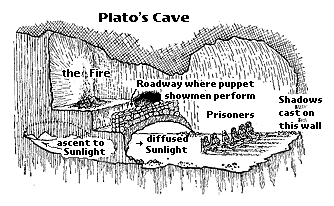veritas or res?
It's been a while since my posts have really lived up to the name of this blog (have they ever? "philosophy" is such a muddy word also), but I just wanted to post a few ideas related to a topic that I've been thinking about recently. Note that my philosophical rhetoric is weak, and I don't claim to know exactly what I'm talking about. Anyone who has anything to offer, I welcome criticism and correction.
What is truth? It's a question that I want to raise in the context of the search for "absolute Truth". I recently said in a conversation that I was moving away, not from the notion that there is truth to be found, but rather that as a limited being, my ability to distinguish what is true is limited by perspective and my experience.
One thing that I found interesting, and relevant to that discussion, which we discussed in my art class was the difference between the thing itself or veritas and the idea of the thing, or res. Tim, our art instructor told us that before Plato people were more concerned with the res and after him, our word for truth and reality was instead defined by veritas. In art, we can never accurately describe our subject, but instead art is always representational. A picture can be "true" and be a "true" representation of the object, capturing the res, but can never be the veritas of the object. Tim found the allegory of Plato's cave to be very helpful. Plato's allegory goes such that there is a cave in which a group of prisoners are bound and all that they can observe are shadow's on a wall infront of them. The prisoners would give names to these shadows, thinking them to be the things themselves, but never seeing the real objects. Their worldview then is not wrong, but rather shaped by their perspective and limited understanding.

As humans, we are like the prisoners. Through no fault of our own, we are inherrantly limited in our view and capability to understand our world. If one of us were to be freed from our bindings, we would find that reality does not line up exactly with our prior view of the world. It would take us a long time to come to grips with the differences between our perceptions before and our new understanding. If after a time we were then to return to the cave and describe our perceptions to our fellow captives, they might think we were crazy. In fact, we might seem rather blind - the dimness of the cave being much darker than the brightness we found outside.
In a sense, religion is like art. I see it as truth, but more in the sense of res than in veritas. Like the story of Moses, when we come before God we can only see a part, for the full pressence of God would be beyond us completely.
What this comes down to is not a denial of truth, nor the ability to understand truth. Like art, some art is better at representing the truth than another. As humans, our goal should be to seek the truth, but still recognize our limitations.


1 Comments:
I am personally a huge fan of Des Cartes--butright now, a friend of mine is taking existentialism and phenomenology, and that is also really interesting in a rather strange way; like Nietzsche, Sartre advocates a genuine response over so-called morality. Nietzsche does believe in what I call capital 'T' Truth, but he vacillates between saying he knows what it is and saying that no human ever will know what it is; but then, you have to remember he was losing his grip on reality while he was writing--my favourite line of his is in Beyond Good and Evil, in which he talks about atheism: "there may even be puritanical fanatics of conscience, who prefer to put their last trust in a sure nothing rather than in an uncertain something. But that is Nihilism, and the sign of a despairing, mortally wearied soul . . . " In light of Plato, I find that especially interesting.
But back to Sartre: to him, the only real truth/morality that there is is the truth/morality you create for yourself; anything imposed on it is in bad faith. It infringes on your infinite nature. Sartrian existentialism is ultimately irrational, (according to my friend) though, because it essentially dictates that if you ever have a reason for anything you do, then you are in bad faith in some way. Now, Christian existentialism is a totally different kettle of fish; my father actually converted to Catholicism because he was first an existentialist. To the best of my understanding, because they believe in a higher power, Xian existentialists acknowledge that there is Truth, and that life is the pursuit of that Truth.
Post a Comment
<< Home